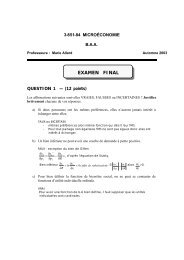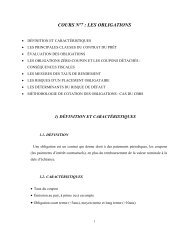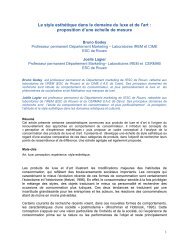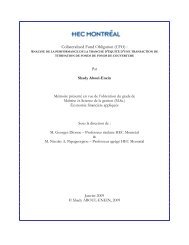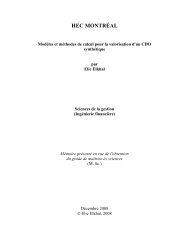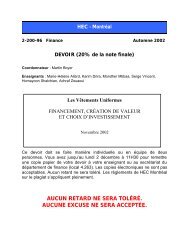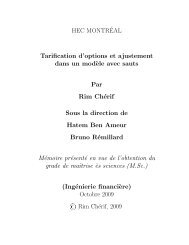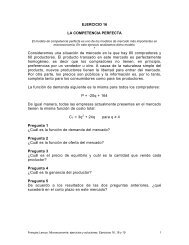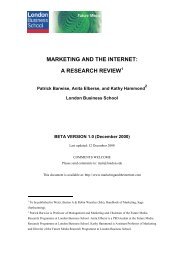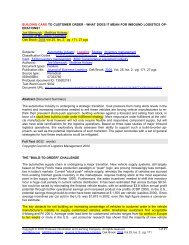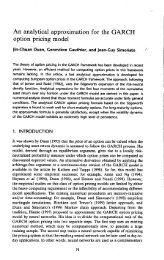- Page 1 and 2:
Volume 2 Contents: A Global Examina
- Page 3 and 4:
A Global Examination Of Relationshi
- Page 5 and 6:
and to measure them simultaneously
- Page 7 and 8:
customers’ total consumption expe
- Page 9 and 10:
From product perceived quality towa
- Page 11 and 12:
cumulative, or a combination of the
- Page 13 and 14:
trust4 -.68 commit1 .59 commit2 .51
- Page 15 and 16:
we observed that the least correlat
- Page 17 and 18:
outside of the consumption experien
- Page 19 and 20:
REFERENCES Anderson Eugene W., Forn
- Page 21 and 22:
Holbrook Morris B. Consumer Value:
- Page 23 and 24:
APPENDIX 1. DESCRIPTION OF THE ITEM
- Page 25 and 26:
An Empirical Examination of Retail
- Page 27 and 28:
This paper is organized in the foll
- Page 29 and 30:
Human and cognitive effort has been
- Page 31 and 32:
Seiders, Berry, and Gresham (2000)
- Page 33 and 34:
The four dimensions of retail conve
- Page 35 and 36:
2000). In-store shoppers receive th
- Page 37 and 38:
process resulted in slightly differ
- Page 39 and 40:
examine the dimensionality of these
- Page 41 and 42:
Seiders, Berry, and Gresham’s (20
- Page 43 and 44:
used, and the respondents were all
- Page 45 and 46:
Enis BM, Roering KJ. Product classi
- Page 47 and 48:
Table 1 Dimensions of Convenience G
- Page 49 and 50:
Table 3 Retail Convenience Scale Re
- Page 51 and 52:
Table 5 Correlations, Means, and St
- Page 53:
Error! Figure 1 Retail Convenience
- Page 56 and 57:
and Novak, 1996; Hammond, McWilliam
- Page 58 and 59:
and Hirschman, 1982, p 132). These
- Page 60 and 61:
interpretations of, all factors par
- Page 62 and 63:
the hedonic aspects of the online s
- Page 64 and 65:
satisfaction (Oliver, 1980; Westbro
- Page 66 and 67:
H6). It involves performing a multi
- Page 68 and 69:
Differences between the “shopping
- Page 70 and 71:
(Hypothesis 5) and online shopping
- Page 72 and 73:
demonstrates the importance of meas
- Page 74 and 75:
Dabholkar, Pratibha A. Incorporatin
- Page 76 and 77:
Mano Haim Elliott Michael T. Smart
- Page 78 and 79:
Zeithaml V., Parasuraman A. Malhotr
- Page 80 and 81:
1. Introduction Like inseparability
- Page 82 and 83:
specific attributes. Dealing with p
- Page 84 and 85:
2.2. Perceived Difficulty of Evalua
- Page 86 and 87:
and mentally intangible a product/s
- Page 88 and 89:
2.4.1. Knowledge and Intangibility
- Page 90 and 91:
category, we included both generic
- Page 92 and 93:
goods exhibit higher levels of phys
- Page 94 and 95:
5.1. Intangibility: Brand and Gener
- Page 96 and 97:
greater involvement with the purcha
- Page 98 and 99:
with generality, may also affect co
- Page 100 and 101:
Berry LL, Clark T. Four ways to mak
- Page 102 and 103:
Laroche M, Bergeron J, Goutaland C.
- Page 104 and 105:
Questionnair es Questionnaire 1 Que
- Page 106 and 107:
Table 3 Results of factor analysis
- Page 108 and 109:
Table 4 Summary of results 108
- Page 110 and 111:
Table 5 Stepwise multiple regressio
- Page 112 and 113:
Table 8 Stepwise multiple regressio
- Page 114 and 115:
114
- Page 116 and 117:
Intangibility Physical intangibilit
- Page 118 and 119:
net income of 94% and 119%, respect
- Page 120 and 121:
this, it is not surprising that eBa
- Page 122 and 123:
frequently referred to as feedback
- Page 124 and 125:
An auction participants’ feedback
- Page 126 and 127:
The objective of study one was to i
- Page 128 and 129:
excerpts that were selected and fus
- Page 130 and 131:
Consumers believed that sellers wit
- Page 132 and 133:
negative feedback could be me,” a
- Page 134 and 135:
idder should read the praises too b
- Page 136 and 137:
first study focused on one class of
- Page 138 and 139:
Rothkopf, Joydeep Srivastava, Rami
- Page 140 and 141:
Industrial Economics. 50:3. 337-349
- Page 142 and 143:
http://www.laxshopper.com/index.htm
- Page 144 and 145:
144
- Page 146 and 147:
Firstly, the consumer is supposed t
- Page 148 and 149:
For the psycho-sociology of environ
- Page 150 and 151:
To analyse appropriation strategies
- Page 152 and 153:
The second strategy is the most ela
- Page 154 and 155:
From the appropriation perspective
- Page 156 and 157:
To test these hypotheses we selecte
- Page 158 and 159:
Glace Glace Chart 4. Spatial config
- Page 160 and 161:
Chart 5b. Spatial configuration of
- Page 162 and 163:
No differences between the three di
- Page 164 and 165:
appropriation strategies adopted by
- Page 166 and 167:
A matrix of space management can th
- Page 168 and 169:
Holbrook M.B. (1999), Introduction
- Page 170 and 171:
Asymmetric Quality Tier Competition
- Page 172 and 173:
Wisniewski (1989) proposed a theory
- Page 174 and 175:
alternatives prior to the choice de
- Page 176 and 177:
decrease in tradeoff when L reduces
- Page 178 and 179:
As Bronnenberg and Wathieu (1996) u
- Page 180 and 181:
Those conceptually based utility fu
- Page 182 and 183: ecent existing research (Sivakumar
- Page 184 and 185: increased by 10% (conceptually the
- Page 186 and 187: REFERENCES Allenby GM. A unified ap
- Page 188 and 189: Table 1. Estimation Results _______
- Page 190 and 191: Q U A L I T a H H’ x b PRICE 190
- Page 192 and 193: MODELING THE IMPACT OF INTERNET ATM
- Page 194 and 195: Eroglu et al (2001) proposed a typo
- Page 196 and 197: playfulness (enjoy visiting Web sit
- Page 198 and 199: H2: When consumers surf the Web, th
- Page 200 and 201: significantly explain attitude towa
- Page 202 and 203: Involvement toward an ad based on v
- Page 204 and 205: usefulness and the resourcefulness
- Page 206 and 207: 3.2.2.2. Involvement The final comp
- Page 208 and 209: environmental cues on purchase beha
- Page 210 and 211: 6. Test of Hypotheses [Insert table
- Page 212 and 213: Cacioppo, Schumann, 1983; Petty and
- Page 214 and 215: Pelsmacker et al, 1998). ATTI is li
- Page 216 and 217: improvements are brought into navig
- Page 218 and 219: Cho, C.H.: How Advertising Works on
- Page 220 and 221: Liu, C. and Arnett, K.P. Exploring
- Page 222 and 223: Rose, G., Khoo, H. and Straub, D.W.
- Page 224 and 225: Table 1: Results of Confirmatory Fa
- Page 226 and 227: Table 2: Full Structural Model Fit
- Page 228 and 229: EXPB� INV H7b NS 0.080 0.062 0.00
- Page 230 and 231: 230
- Page 234 and 235: Attempts to use a framework to find
- Page 236 and 237: attempts resulting in failure are n
- Page 238 and 239: included in this sentence would be
- Page 240 and 241: Detailed causal maps are needed in
- Page 242 and 243: Start-up. Details of the stream of
- Page 244 and 245: more successful when they avoid big
- Page 246 and 247: Axelrod, Robert (1976), "The Cognit
- Page 248 and 249: 1. Brian Shore starts several + 2.
- Page 250 and 251: + 1. B.S. ‘Maximizes use of fryin
- Page 252 and 253: degree of importance consumers plac
- Page 254 and 255: initial use of the word “convenie
- Page 256 and 257: In the decision-making process, tim
- Page 258 and 259: at home 24 hr/7 days a week (Hofack
- Page 260 and 261: Figure 1 about here ---------------
- Page 262 and 263: the organization and design of the
- Page 264 and 265: ehavior courses participated as bot
- Page 266 and 267: convenience is different for the tw
- Page 268 and 269: should seek to establish a similar
- Page 270 and 271: obtained a small sample size of onl
- Page 272 and 273: Dunn DT, Thomas CA, Lubawski JL. Pi
- Page 274 and 275: Table 1 Dimensions of Convenience G
- Page 276 and 277: Table 3 Retail Convenience Scale Re
- Page 278 and 279: Table 5 Correlations, Means, and St
- Page 280 and 281: Error! Figure 1 Retail Convenience
- Page 282 and 283:
Customer-to-customer interaction is
- Page 284 and 285:
Second, we need to find out the opt
- Page 286 and 287:
esponse to the behavior of other cu
- Page 288 and 289:
ewards (Swinyard 1993). A customer
- Page 290 and 291:
Values may be defined as beliefs th
- Page 292 and 293:
find out the optimal combination of
- Page 294 and 295:
Taguchi recommends the use of signa
- Page 296 and 297:
epresent higher tolerance of incomp
- Page 298 and 299:
estaurant where they can escape inc
- Page 300 and 301:
Three significant interaction terms
- Page 302 and 303:
McGrath, Mary Ann, Otnes, Cele, (19
- Page 304 and 305:
Table…2 Tests of Between-Subjects
- Page 306 and 307:
Figure…2 (a) Combination of L4 Ta




